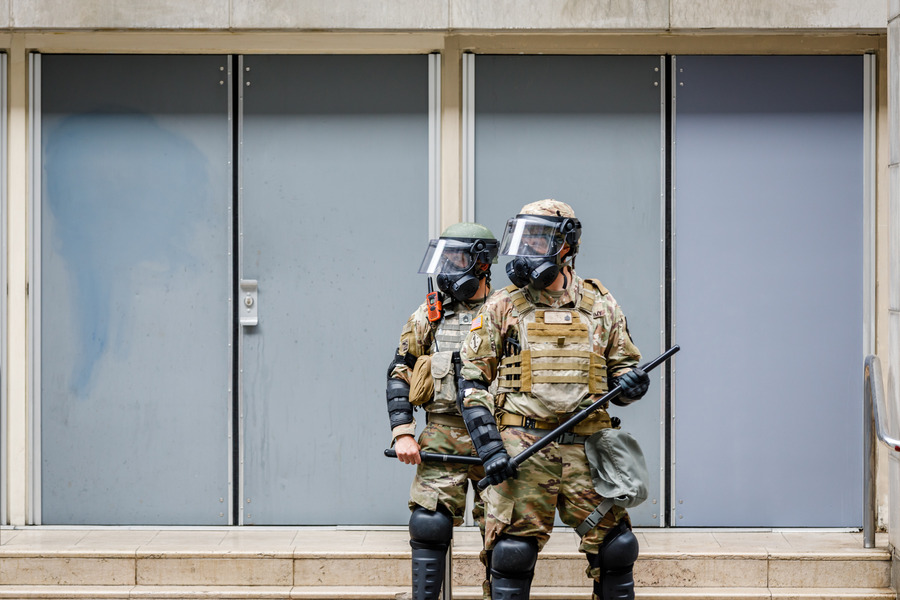Today's Headlines and Commentary
At the House Intelligence Committee’s open hearing on Russian interference in the presidential election, FBI Director James Comey confirmed the existence of an ongoing investigation into election interference and possible connections between Trump associates and the Kremlin. Both Director Comey and NSA Director Admiral Mike Rogers stated that they have no evidence that President Obama unilaterally ordered a wiretap on President Trump, as Trump has repeatedly claimed without substantiation.
Published by The Lawfare Institute
in Cooperation With

At the House Intelligence Committee’s open hearing on Russian interference in the presidential election, FBI Director James Comey confirmed the existence of an ongoing investigation into election interference and possible connections between Trump associates and the Kremlin. Both Director Comey and NSA Director Admiral Mike Rogers stated that they have no evidence that President Obama unilaterally ordered a wiretap on President Trump, as Trump has repeatedly claimed without substantiation. Trump has responded in two tweets, one asserting that “the NSA and FBI [told] Congress that Russia did not influence electoral process” and the other writing that Director Comey “refuse[d] to deny he briefed President Obama on calls made by Michael Flynn to Russia,” though Comey clarified that nothing should be read into his refusal to comment. While Comey and Rogers stated that the Russian government did not meddle with election infrastructure, they made clear that the Kremlin did try to influence the election. The New York Times has more.
Peter Westmacott, former British ambassador to the United States, has written in the Guardian that White House Press Secretary Sean Spicer’s comments about British wiretapping are “absurd,” and “dangerous,” and accuses both Spicer and President Donald Trump of “peddling falsehoods.”
The Washington Post tells us that Secretary of State Rex Tillerson attempted to build a constructive and “results-oriented” relationship with the leadership in Beijing over the weekend, as he met with Chinese President Xi Jinping. But Tillerson, who received a warm welcome from Xi, has been accused by some of handing Beijing a “diplomatic victory,” due to his use of Chinese catchphrases about the U.S.-China relationship, including the need to avoid confrontation and the need to build “mutual respect,” and strive for “win-win” cooperation. The phrase “mutual respect,” has often been taken to mean that the U.S. should stay away from core Chinese interests, such as the South China Sea and Taiwan.
The Wall Street Journal informs us that as Tillerson met with Jinping, North Korea claimed that it had tested a new high-thrust rocket engine, a report that the Trump administration is working to determine the accuracy of. The test comes as Tillerson is trying to have the Chinese agree to tamp down on North Korea, and has rejected the idea of diplomatic talks and has raised the prospect of military action. Trump apparently held meetings on Sunday dealing with North Korea and China, and said that North Korean leader Kim Jong-un was “acting very, very badly,” but there was no official statement from the White House, the State Department, or the Pentagon.
The Post writes that the battle to define the “America First” foreign policy that Trump outlined in his inaugural address has divided the White House, with Defense Secretary James Mattis and national security adviser Lt. Gen. H.R. McMaster counseling the president to focus on global threats and problems and to cooperation with foreign governments, while others have championed a hardline and a narrow focus on U.S. interests. The fight has played out over every issue from how to fight ISIS to how to deal with Iran.
The Journal informs us that White House adviser Kellyanne Conway’s husband, George Conway, is posed to be tapped to lead the Civil Division of the Justice Department, which oversees federal lawsuits over a variety of issues including defending Trump’s order on immigration. Conway has worked for decades as a partner at the law firm Wachtell, Lipton, Rosen & Katz, specializing in securities litigation and other corporate legal issues.
The Journal also tells us that as of Friday afternoon, the Justice Department decided to appeal the preliminary injunction placed on Trump’s revised travel ban by a Maryland-based federal district court. The administration also filed a “motion for clarification” of the temporary restraining order issue against the executive order in Hawaii, which the district judge denied. Judges in both Maryland and Hawaii issued injunctions only hours apart, right before the new executive order was set to take effect.
The New York Times reports that an attack by a gunman on a soldier at Orly Airport in France on Saturday is being treated as a possible act of terrorism. After shooting and injuring a police officer, firing his gun in a bar, and carjacking a vehicle to speed to the airport, Ziyed Ben Belgacem was shot by two soldiers. He reportedly yelled, “I’m here to die in the name of Allah.”
Violent clashes have broken out between Syrian rebels and government forces in Damascus, with the government successfully pushing back against a rebel advance on the Old City, Reuters writes. Rebel forces affiliated with Jabhat Fateh al-Sham and the Free Syrian Army advanced on the Old City on Sunday, with government troops bombarding rebel-held areas of the city in response. Peace talks are set to begin in Switzerland on March 23rd, the AFP reminds us.
Fighting continues in Mosul, where a U.S. airstrike in support of Iraqi troops killed six ISIS leaders, one of whom was Russian, Reuters reports. Iraqi ground troops are pushing toward the historic al-Nuri Mosque, where ISIS leader Abu Bakr al-Baghdadi famously declared a caliphate three years ago. As residents of Mosul flee the city in increasing numbers, refugee camps in the region are reaching capacity.
The Times begins an in-depth study of ongoing crackdown on rights in Turkey. Meanwhile, the Turkish government has accused Germany of supporting Fethullah Gulen, the reclusive Pennsylvania-based cleric whom President Recep Tayyip Erdogan has blamed for the failed coup in July. Reuters has more.
The United Kingdom will invoke Article 50 of the Lisbon Treaty to begin the process of withdrawing from the European Union on March 29th, setting the timetable for a full retreat from the EU by 2019, the Times writes. President of the European Council Donald Tusk will present draft guidelines for the Brexit process within 48 hours of the formal notice. Prime Minister Theresa May faces a difficult road ahead, with widespread concerns over the possibility of completing negotiations in time for the proposed 2019 withdrawal.
Counsel for Guantanamo detainee Abd al-Rahim al-Nashiri are now seeking to take Nashiri’s habeas case up to the Supreme Court on the grounds of his years of “physical, psychological and sexual torture” at the hands of CIA interrogators. The documents declassified along with the petition for certiorari contain new information on Nashiri’s treatment in detention, including the lasting psychological effects that seem to indicate post-traumatic stress. The Times and McClatchy have more.
ICYMI: This Weekend, on Lawfare
Quinta Jurecic posted the Lawfare Podcast on “Cybersecurity in the Trump Administration.”
Paul Rosenzweig flagged a report about a Maryland man weaponizing Twitter.
Benjamin Wittes explained how we should listen to Jim Comey’s testimony today.
Raphael S. Cohen examined why strategies don’t work, and how to fix them.
Email the Roundup Team noteworthy law and security-related articles to include, and follow us on Twitter and Facebook for additional commentary on these issues. Sign up to receive Lawfare in your inbox. Visit our Events Calendar to learn about upcoming national security events, and check out relevant job openings on our Job Board.





